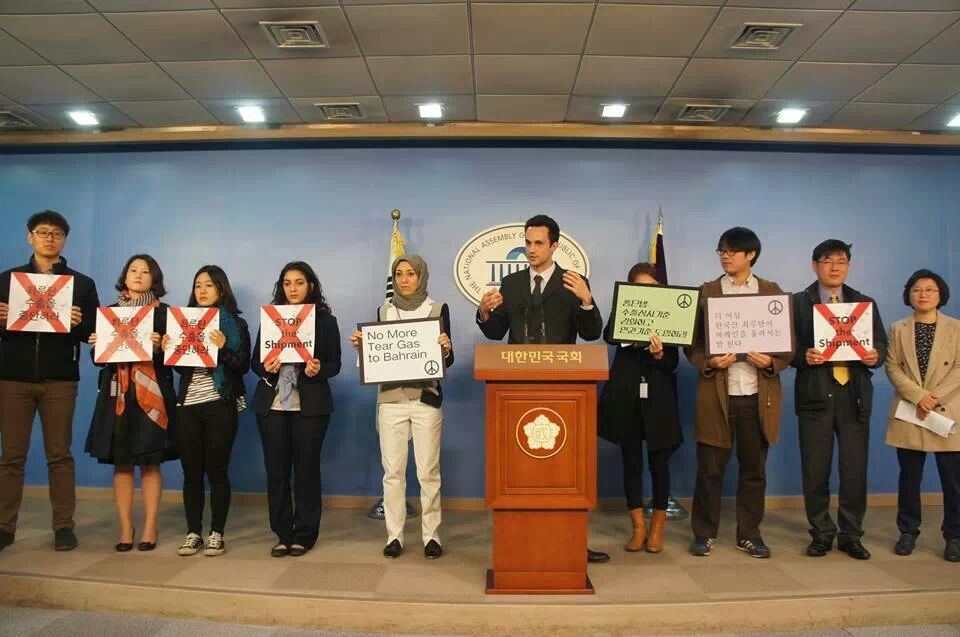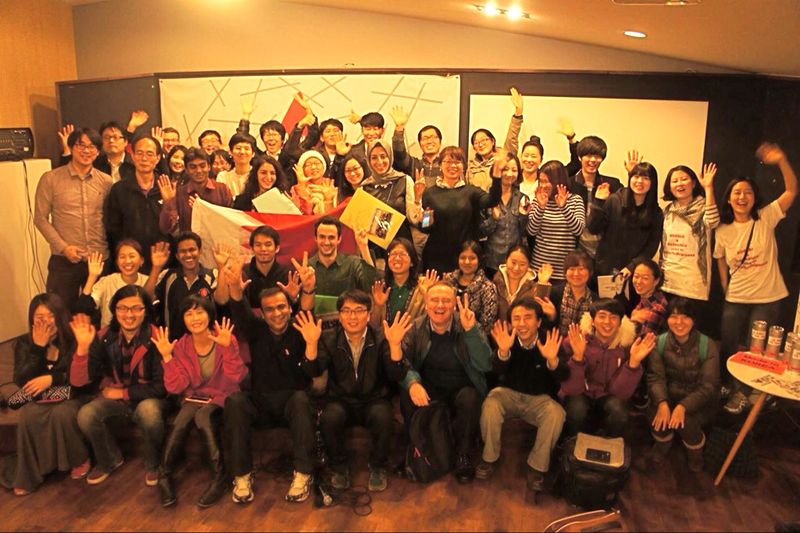[The following press release was issued by Bahrain Watch on 26 March 2014]
A Bahrain Watch delegation has returned from a weeklong visit to Seoul, at the invitation of South Korean civil society activists. The purpose of the trip was to educate the government and public about ongoing human rights violations and misuse of tear gas in Bahrain, in support of a draft legislative amendment to block arms sales to human rights violators. The amendment, sponsored by MPs Kim Hyun and Jang Hana, would block sales like last year’s bid by Dae Kwang Chemical Corporation to export 3 million tear gas canisters to Bahrain. That proposed sale was successfully halted after the government denied an export license, under pressure from the grassroots #StopTheShipment campaign. Korean arms control law does not have human rights controls, and the agency that licenses exports has set specific targets to increase foreign arms sales.
The delegation, comprising Ala’a Shehabi, Bill Marczak, and Nazgol Kafai, met the MPs sponsoring the bill, and spoke at a press event and debate at the National Assembly of South Korea, the country’s legislature. The delegation also met with members of the media, as well as officials from the Defense Acquisition Program Administration (DAPA), the Ministry of Defence, the Ministry of Foreign Affairs (MoFA), and the Korean National Police Agency (KNPA).
In meetings with officials, the delegation was told that South Korea did not export any tear gas to Bahrain in 2013 or 2014, and that several government agencies are moving towards an agreement to block future exports to the country.
Meetings with Officials
The delegation presented the cases of Sayed Hashim Sayed Saeed and Ali Jawad al-Shaikh, killed by direct shooting of tear gas, to the National Assembly, government officials, and the media. The delegation emphasized that Dae Kwang Chemical Corporation, which also exported 1.5 million canisters of tear gas to Bahrain in 2011 and 2012, should be investigated and held responsible for the deaths caused by selling its weapons to a known human rights abuser.
Officials from KNPA and the Ministry of Defense expressed regret for tear gas deaths in Bahrain, noting that Korean students Kim Ju-Yul and Lee Han-yeol were killed by similar methods in 1960 and 1987. Both deaths were pivotal moments in Korean democracy protests, which ultimately achieved elections and democratic reforms. Since 1998, Korea has had a policy of not using tear gas against its own citizens.
An official from KNPA further stated that several agencies were taking steps towards an agreement to ban tear gas exports to Bahrain: “I want to provide assurance and confirmation that [officials from KNPA, DAPA, MoFA, Ministry of Industry and Trade, and Ministry of Defence] are almost fully in agreement over forbidding the export of tear gas for human rights violations.” He also expressed regret for tear gas deaths in Bahrain, and said of the deaths: “the Korean government is not indifferent to what is taking place in Bahrain and I believe that the Korean government will take responsibility going forward.”
South Korean civil society activist Seungho park of Weapon Zero, who met officials together with the Bahrain Watch delegation, said afterwards: “Our meetings further highlighted the need for amending the arms control law as current law provides absolutely no human rights criteria in authorizing arms export to countries where there is a substantial risk that arms could be used for serious violations of human rights. This is why massive exports of tear gas products to Bahrain were approved even when there was clear evidence that tear gas had caused at least 39 deaths in Bahrain. To prevent further exports of arms to countries where the arms would be used for internal repression, it is vital that the National Assembly passes the amendment bill in the near future.”
Solidifying Transnational Solidarity
Solidarity from Korean civil society activists was crucial to the success of the #StopTheShipment campaign. Korean activists supported the effort through protestsoutside DAPA and MoFA, several online actions, and repeated inquiries to the government. Bahrain Watch looks forward to continuing to stand in solidarity with its Korean friends in their effort to ensure that Korea never again arms human rights violators.
The delegation’s visit ended with a public event titled “Tear Gas in Bahrain and the Arab Spring.” More than 50 people packed into Space Noah to participate in the interactive discussion about the situation in Bahrain, and the role of Korea.
The campaign received extensive media coverage, including articles in Korea’s main progressive newspaper, The Hankyoreh, Seoul Shinmun, and Korea JoongAng Daily.

